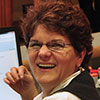This article is more than 5 years old.
Day 1: OLE Project, Duke University
On Monday, December 15, Lauren C., Erik and Mary Beth attended the OLE Project , Open Library Environment Regional Design Workshop held at Duke University
The OLE Project is funded by a grant from the Andrew Mellon Foundation and is meant to design an architecture for an open source ILS.Day 1 participants began to describe critical processes.We had pre conference homework which included thinking about:1. Which feature, currently available in the ILS would we not want to live without?2.What is the biggest frustration with the ILS?3.How would you describe what an ILS is?4.If you could design an ILS today, what would it look like and how would it function?There were 50 to 60 participants from all around the south east, most from academic libraries, and one from Forsyth County Public. (Interestingly, only a handful of people from Access Departments, many more from Systems, Acquisitions and Cataloging. No one was here representing Special Collections or Preservation.)
The group work today through breakout sessions and then in the larger group, was to identify the work that was core and broad enough to be flexibly build into the ILS.There was some healthy debate about what needed to be included in the “critical” category, as well as what was to be included as “high level” enough.We had a chance to try out a 4/6 presentation wherein one participant brought forth a burning issue and discussed it for 4 minutes, then the group was given 6 minutes to comment or question the presenter.The issue the participant brought forth was the importance of creating an ILS that will support consortia, and I thought how valuable that would be as we move forward with more TALA like agreements.The last lecture of the day was describing service oriented architecture and business process modeling.Then we had a chance to practice creating a model process that included creating a process map for checking out a book and all the decision points that go into that simple process.(It was more challenging than it sounds.)
Today we are going to be doing more business process modeling.

2 Comments on ‘Day 1: OLE Project, Durham, NC’
The lack of representation from certain areas was unfortunate – particularly because the work that has been done in these areas (digital archives / services, public service initiatives, discovery & reference services) over the last few years could really help inform workflow and metadata models for a new system.
Maybe the other regional workshops will include representation from the areas that Durham missed.
Great start!